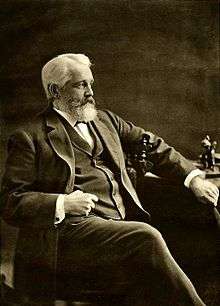Edward Atkinson (activist)

Edward Atkinson (February 10, 1827 – December 11, 1905) was an economist and a founder of the American Anti-Imperialist League.
Biography

He was born in Brookline, Massachusetts and educated in private schools. He received a Ph.D. from Dartmouth College and an LL.D. from the University of South Carolina.[1] In the decade before the Civil War, Atkinson was a successful entrepreneur as an executive of some of the leading cotton mills of New England. Later, he was President of Boston Manufacturers Mutual Insurance Company and the Mutual Boiler Insurance Company of Boston. He invented an improved kitchen stove known as the “Aladdin cooker.”[1]
He also fought against slavery by supporting the Free-Soil Party and a Boston committee to aid escaped slaves. Growing weary of compromise, he began raising money to pay for rifles and ammunition to support the insurgent guerrilla force of John Brown. In 1866, he was chosen a delegate to the national union convention held in Philadelphia, but he took no part in its deliberations. He was elected a Fellow of the American Academy of Arts and Sciences in 1879.[2]
He was inspired by the ideas of Adam Smith, Richard Cobden, and John Bright, and he became a leading publicist for free trade. In many ways, he can be described as the American counterpart to Frédéric Bastiat. He spoke out against the inflationist ideas of William Jennings Bryan and others but, unlike some, favored the total denationalization or privatization of money.[3]
He campaigned for Grover Cleveland and participated in the formation of the Clevelandite National Democratic Party (United States) third party in 1896. Atkinson was appalled by the colonialist and imperialist policies of the McKinley and Roosevelt administrations in the wake of the Spanish–American War. He reacted by becoming a full-time activist in the American Anti-Imperialist League. As a vice president of that organization, Atkinson wrote to the United States Department of War for a list of soldiers serving in the Philippines so that he might send them his privately published pamphlets. Failing to receive a reply, Atkinson announced to the press that he was sending copies to Generals Lawton, Miller, and Otis, Admiral Dewey, correspondent J. F. Bass, and to Jacob Shurman and Dean Worcestrer on the Philippine Commission.
On February 17, 1899, Edward Atkinson sent three pamphlets to test the right of citizens of the United States to the free use of the mail:
- "The Cost of a National Crime," detailing the American military oppression of the Filipinos and the spiraling cost of the war to American taxpayers.
- "The Hell of War and Its Penalties"
- "Criminal Aggression: By Whom Committed?"
United States Postmaster General Charles Emory Smith ordered that the pamphlets be seized in San Francisco, declaring them "seditious". The United States Attorney General hinted that he would charge Atkinson with treason and sedition, but decided against it, as officials feared that charging him would only make the 72-year-old a martyr.[4]
The US pro-expansion press called Atkinson a "latter-day copperhead". Atkinson seemed to enjoy the infamy, and he effusively and sarcastically thanked the Administration for calling national attention to his essays and increasing their demand in every state in the union.[5]
Works
For nearly four decades, Atkinson was actively engaged in the distribution of brochures of which he was the author on banking, competition, cotton manufacture, economic legislation, fire prevention, industrial education, the money question, and the tariff. In addition to his 1899 series of pamphlets, broadcast over the United States, which he entitled "The Anti-Imperialist:"[1]
- "The Distribution of Products" (New York, 1885)
- "Margin of Profits" (1887)
- "Industrial Progress of the Nation" (1889)
Family
Atkinson married Mary Caroline Heath in 1855; they had 9 children, 7 of whom survived to adulthood.[6] One of his sons, Robert Whitman Atkinson (1868-1934) was a musician and composer best known for composing "The Party at Odd Fellows Hall", a popular waltz of the 1890s, to words by J. Wendell Jr.. The song was written while they were both students at Harvard in 1891.
References
- 1 2 3
 Wilson, James Grant; Fiske, John, eds. (1900). "Atkinson, Edward". Appletons' Cyclopædia of American Biography. New York: D. Appleton.
Wilson, James Grant; Fiske, John, eds. (1900). "Atkinson, Edward". Appletons' Cyclopædia of American Biography. New York: D. Appleton. - ↑ "Book of Members, 1780-2010: Chapter A" (PDF). American Academy of Arts and Sciences. Retrieved 27 April 2011.
- ↑ David T. Beito and Linda Royster Beito, "Gold Democrats and the Decline of Classical Liberalism, 1896-1900," Independent Review 4 (Spring 2000), 555-75
- ↑ Beito and Beito, 555-75
- ↑ Miller, Stuart Creighton (1982). "Benevolent Assimilation" The American Conquest of the Philippines, 1899-1903. Yale University Press. ISBN 0-300-02697-8., page 107; Boston Herald, 22 April, 23, 24, 1899; New York Times, 23 April 1899; San Francisco Call, 24 April 1899.
- ↑ Massachusetts Historical Society guide to the Atkinson papers
External links
| Wikisource has original works written by or about: Edward Atkinson |
- Biography and Bibliography of Edward Atkinson: "Liberty and Anti-Imperialism"
- Edward Atkinson's The Anti-Imperialist: "Liberty and Anti-Imperialism"
- WorldCat